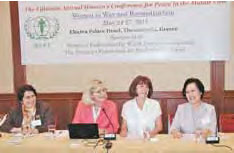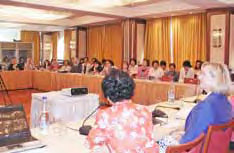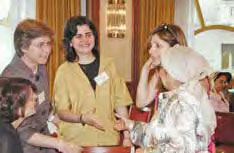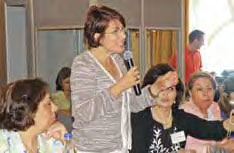2011 Greece
Women in War and Reconstruction
CAROLYN HANDSCHIN
MAY 24-27, 2011 - TESSALONIKI, GREECE
15th Annual Women's Conference for Peace in the Middle East
Women's Federation for World Peace dedicated its 15th Annual Women's Conference for Peace in the Middle East to the commitment of women to peace and development in times of conflict and in times of community or national reconstruction - within a framework of strategies, tools, alliances and best practices. This theme was also conceived to examine the first decade's achievements of Security Council Resolution 1325 which recognizes that not only are the needs of women different than men's in times of war and conflict, but so is their contribution to resolution. As agents of peace, the engagement, expertise and ingenuity of women is fundamental to success - as the first 14 conferences of this series and history has proven.
The conference was cosponsored by WFWPI and WFWP Japan. Nearly 70 women leaders from 20 countries of the Middle East/North Africa, Europe and the Far East, as well as from 5 UN agencies (UNHCR, UNRC, UNRWA, IOM, UNICEF) gathered in serious discussion.
Nearly all the presenters, the majority of whom are working in the region, as well as other participants, testified over and over about the critical and courageous role that women of all ages have been playing in these processes of mobilization, transformation and nation building. Yet, (excerpt from the outcome document "Appeal and Recommendations" of the conference) "despite their sacrifices, these women, who could have been valuable agents of conflict resolution and peace building, in compliance with Security Council Resolution 1325 on Women, Peace and Security, often find themselves marginalized and excluded from reconstruction processes. The crosscutting issue of gender which acknowledges the valuable contribution of women cannot be bypassed without the dire consequences of undermining efforts of post conflict reconstruction."
Acknowledgement of the importance of the issues at hand began with the welcoming remarks from the Mayor of Thessaloniki. The conference was divided into four key areas:
Women's best practices in conflict prevention and resolution,
Women's best practices promoting social cohesion and nation building,
Government / UN / NGO cooperation: using the tools and strategies provided to empower women and protect their rights, and
The influence of media.
Essential elements of the discussions were summarized in the Recommendations drawn up during the conference by a small team of participants and accepted in consensus by all.
They are as follows:
Calling for the participation of women in peace negotiation and peace building at all decision making levels.
Enhancing the knowledge and education at the family and formal levels through giving equal opportunities for both girls/women and boys/men, in accordance with international legal framework on gender.
Targeting governmental bodies and urging them to change repressive legislation against women and women's rights, in order to help overcome gender discrimination.
Ending impunity for gender based crimes and creating accountability.
Actively engaging women in reconciliation processes as facilitators and not only as victims or beneficiaries.
Acknowledging and encouraging support for the preeminent role that women have in times of crises as providers of security and stability- not only as victims of the lack of it.
Appreciating that women have a unique position within families and communities to detect early warning signs of unrest and if empowered could pilot preventive measures.
Adopting appropriate laws promoting and protecting equal rights for men and women.
Involving national NGOs and other stakeholders to work with their respective governments on the creation of national action plans on the implementation of security council resolution 1325, with reporting mechanisms as is required .
Building the capacity of national NGOs to respond to the needs of their local communities in conflict and post conflict situation.
Launching awareness campaigns on Security Council resolution 1325 and human rights education with the support of UN agencies.
Guaranteeing the full participation of women in all fields of the labor market and their involvement in the national economy with special focus on the female headed household.
Working on the creation of an independent structure to monitor the situation of women in their countries through the collection of research, media, statistics, testimonies, school curricula and all available data in order to "map" women NGOs and entities for lessons learned and best practices. Creating a database/ website to serve this purpose.
With these guidelines, the participants at the 15th Conference for Peace in the Middle East, call upon their respective governments, NGOs and Civil Society, beginning with themselves, to consider and implement the above recommendations, to enhance efforts to achieve peace and development in their nations.





